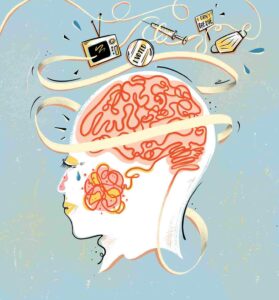Do you feel constantly rushed and overwhelmed? Do you find it difficult to relax and enjoy your time off? If so, you may be struggling with perceived stress. This is a type of stress that is not caused by actual events, but by our interpretation of these events. In this blog post, we will discuss what perceived stress is, the symptoms associated with it, and how to manage it.
Contents
What Is Perceived Stress?
 Perceived stress refers to how we think and feel about our lives. It’s the way we interpret and react to the events happening around us. Everyone experiences stress, but how we each perceive it can be very different.
Perceived stress refers to how we think and feel about our lives. It’s the way we interpret and react to the events happening around us. Everyone experiences stress, but how we each perceive it can be very different.
Some people may see a stressful situation as a challenge, while others may see it as an overwhelming hurdle. Our perceptions are shaped by our past experiences, our culture, and our individual personalities.
Moreover, perceived stress is not necessarily related to the actual number or severity of stressors in our lives. It’s possible to have few stressors but feel a great deal of stress, or vice versa. In simple words, it is our own personal perception of stress that matters.
How Does Perception Affect Stress Levels?
Perception plays a big role in how we experience stress. If we perceive a situation to be stressful, our bodies will respond accordingly. The stress response is a natural reaction that helps us deal with danger or threat.
It’s important to remember that not all stress is bad. In fact, a certain amount of stress can be good for us. It can help us stay alert and motivated. But when stress becomes too much, it can have negative effects on our health.
According to studies, in this era of social media and 24/hour news cycles, our perceptions of stress have become more negative. We are constantly bombarded with images and stories of violence, crime, natural disasters, and political turmoil. This can lead to feelings of fear and anxiety.
In fact, people try to avoid stressful situations, but this isn’t always possible. We can’t always control what happens to us, but we can control how we react to it. Our perception of a situation is what determines our stress response.
What Are The Signs Of Perceived Stress?
 There are a variety of signs and symptoms that can indicate someone is experiencing perceived stress. It is important to remember that not everyone will experience the same symptoms and that the severity of symptoms can vary from person to person.
There are a variety of signs and symptoms that can indicate someone is experiencing perceived stress. It is important to remember that not everyone will experience the same symptoms and that the severity of symptoms can vary from person to person.
Some common signs and symptoms of perceived stress include:
- overwhelmed or out of control
- constantly tense or on edge
- irritable or easily angered
- feeling like you can’t cope
- feeling like everything is a struggle
- tired all the time
- difficulty sleeping
- poor concentration or memory
These are some common signs and symptoms that someone may be experiencing perceived stress. If you are experiencing any of these symptoms, it is important to reach out for help.
Moreover, it is important to remember that perceived stress can manifest itself in different ways for different people. If you are concerned about your stress levels, it is important to speak with a mental health professional.
What Causes Perceived Stress?
There are a variety of factors that can contribute to perceived stress. It is important to remember that what may cause stress for one person, may not cause stress for another. It is also important to remember that we all react to and cope with stress differently. Some common causes of perceived stress include:
- major life changes (getting married, having a baby, starting a new job)
- financial problems
- health issues
- family conflict
- workplace stress
- caring for a loved one
The causes are limitless, but these are some of the more common ones. Also, keep in mind that it is not necessarily the event or situation that causes stress, but our perception of it. Our interpretation of a situation can have a major impact on how we feel about it and how it affects us.
Researchers are studying still the causes and effects of perceived stress. Some studies have found that certain personality traits, such as perfectionism or a pessimistic outlook, may make some people more susceptible to experiencing stress. Other studies have looked at how our social support systems (or lack thereof) can contribute to perceived stress.
It is likely that there are many factors that contribute to the development of this condition. The good news is that there are things you can do to manage and cope with perceived stress.
How To Manage It?
 When it is constant, stress can take a toll on your health both mentally and physically. It is important to find ways to manage your stress so that it doesn’t impact your day-to-day life. Here are some tips:
When it is constant, stress can take a toll on your health both mentally and physically. It is important to find ways to manage your stress so that it doesn’t impact your day-to-day life. Here are some tips:
Exercise
Exercise is a great way to release tension and improve your overall mood. It is also a great way to get some endorphins flowing, which can help to improve your mood and reduce stress levels. Also, it is believed that exercise is so effective at managing stress because it helps to increase levels of serotonin in the brain, which is a key player in regulating mood. Some of the examples can be:
- Taking a brisk walk in your neighborhood,
- going for a run, or
- taking a gym class.
Yoga
In addition to exercise, yoga is another great way to manage stress. Yoga involves both physical and mental components, which can help to stretch and strengthen your body while also calming your mind. There are many different types of yoga, so you can find one that is best suited for your needs. Some examples might include:
Hatha yoga: This type of yoga is focused on slow and steady movements.
Vinyasa Yoga: This type of yoga is a bit more active, with faster movements and transitions.
Iyengar yoga: This type of yoga focuses on precision and alignment.
Bikram yoga: This type of yoga is conducted in a hot room and focuses on 26 different poses.
Mindfulness meditation
Mindfulness meditation is a type of meditation that helps you to focus on the present moment. This can be done by focusing on your breath or by paying attention to the sensations in your body. Mindfulness meditation has been shown to be effective in reducing stress and anxiety.
There are a few things that you can do to help reduce your stress levels. One of those things is to practice mindfulness meditation. Mindfulness meditation can help you to focus on the present moment and become more aware of your thoughts and feelings. This can help you to better manage your stress levels.
Enough sleep
It is important to get enough sleep when managing perceived stress. This is because when you are tired, your body is unable to cope with stress as effectively. Aim for at least eight hours of sleep every night. In fact, you should aim for eight hours of sleep every night regardless of whether or not you are experiencing stress.
Additionally, you can try some relaxation techniques before bed such as reading or taking a bath. These activities will help to ease your mind and prepare you for a good night’s sleep. If you have trouble falling asleep, there are also many helpful products on the market such as herbal teas and relaxation CDs.
Healthy diet
Eating a healthy diet is recommended by healthcare professionals to help manage stress. A healthy diet includes:
- plenty of fruits,
- vegetables, and
- whole grains.
It is also important to limit processed foods, sugary drinks, and alcohol. Eating a nutritious diet can help the body to better handle stress. Moreover, it is essential to stay hydrated by drinking plenty of water throughout the day.
Aromatherapy
 It is a technique that uses essential oils to promote relaxation and well-being. Aromatherapy can be used in a variety of ways, including:
It is a technique that uses essential oils to promote relaxation and well-being. Aromatherapy can be used in a variety of ways, including:
- Inhalation: This involves diffusing essential oils into the air or directly inhaling them from a bottle or tissue.
- Topical application: Essential oils can be diluted with a carrier oil and applied to the skin.
- Massage: Aromatherapy massage involves adding essential oils to a carrier oil and massaging it into the skin.
Aromatherapy is thought to work by stimulating the olfactory system, which is the part of the brain that processes information about the smell. This can promote relaxation, improve mood, and provide other health benefits.
Herbal remedies
These days, herbal remedies are becoming more and more popular. There are many different herbs that can be used to help relieve stress. Some of the most popular herbs for stress relief include:
- Chamomile
- Lavender
- Rosemary
- St. Wort
There are many different ways to take these herbs. Some people prefer to take them in pill form, while others like to drink tea made with herbs. Whichever way you choose to take them, herbal remedies can be a great way to help reduce stress levels. If you’re looking for a more natural way to deal with stress, consider trying herbal remedies.
Acupuncture
It is one of the oldest and most popular forms of alternative medicine. Acupuncture is said to help with a variety of conditions, including pain relief, stress management, anxiety, and more. It is a technique that involves stimulating specific points on the body with thin needles.
Acupuncture works by balancing the flow of energy in the body. It is believed that when this energy is not balanced, it can lead to illness and disease. By stimulating specific points, acupuncture is thought to help correct imbalances and restore health.
In fact, a study found that those who received acupuncture had significantly lower levels of perceived stress than those who received no treatment at all.
Music
 Music is considered one of the most effective ways to reduce stress. It can have a profound effect on both the body and the mind, helping to lower blood pressure, heart rate, and cortisol levels. Listening to calming music for even just a few minutes can help you feel more relaxed and less anxious.
Music is considered one of the most effective ways to reduce stress. It can have a profound effect on both the body and the mind, helping to lower blood pressure, heart rate, and cortisol levels. Listening to calming music for even just a few minutes can help you feel more relaxed and less anxious.
There are many different types of music that can be effective for stress relief. Classical music, nature sounds, and even certain types of pop music have been shown to help lower stress levels. If you don’t know where to start, there are plenty of online streaming services that offer relaxation channels or playlists specifically designed for stress relief.
“Me” Time
It’s important to make time for yourself, to do things that make you happy and relaxed. This can be different for everyone, but some examples might include:
- Reading
- Going for walks
- Spending time with friends or family
When you have some downtime, try to avoid activities that are stressful or overwhelming. Instead, focus on things that will help you feel calmer and more relaxed.
Therapy
Therapies are effective in reducing stress. There are many different types of therapy, but some common ones include:
- Cognitive-behavioral therapy
- Mindfulness-based stress reduction
Cognitive-behavioral therapy helps you identify and change negative thinking and behavior patterns that contribute to stress. And MBSR is a form of meditation that can help you become more aware of the present moment and reduce stress.
Both cognitive-behavioral therapy and MBSR have been shown to be effective in reducing stress. If you’re interested in exploring therapy, talk to a mental health professional to see if it’s right for you.
Support groups
 It is believed that when you share your stress with others who are experiencing similar levels of stress, your perceived stress decreases. Joining a support group can be very beneficial in managing your perceived stress.
It is believed that when you share your stress with others who are experiencing similar levels of stress, your perceived stress decreases. Joining a support group can be very beneficial in managing your perceived stress.
In fact, there are various types of support groups available, such as:
- Online support groups
- Face-to-face support groups
- Support groups for specific conditions or disorders
They can help you find a group that is right for you. You can also ask friends or family members if they know of any groups in your area. These are some helpful ways to manage your perceived stress. Remember, it is important to find what works best for you. If you are feeling overwhelmed by your stress, please reach out to a mental health professional for help. In this way, you can develop a plan to manage your stress in a healthy and productive way.
Conclusion
To conclude, perceived stress is the feeling of being overwhelmed or unable to cope with the demands of a situation. It is different from anxiety and depression, although it can be a symptom of both. Chronic stress can lead to physical and mental health problems, so it is important to find ways to manage it. There are many effective coping strategies, so find what works best for you and stick with it.
For more information, please contact MantraCare. Stress can have both physical and mental effects on the body, leading to negative consequences such as anxiety, depression, and even physical illnesses. If you have any queries regarding Online Stress Counseling experienced therapists at MantraCare can help: Book a trial Stress therapy session


